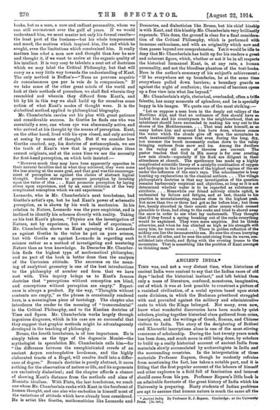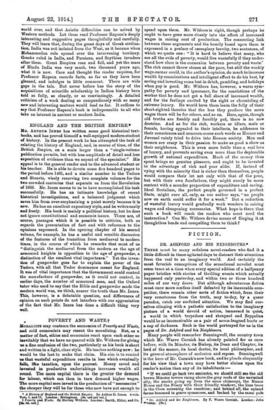ANCIENT INDIA.*
TIME was, and not a very distant time, when historians of ancient India were content to say that the Indian races of old days " lacked the historical instinct," and left behind them only a mass of literature, confused, monstrous, imaginative, out of which it was at best possible to construct a picture of a vanished civilization, of a social system based upon strict caste divisions, in which the Brahman priesthood struggled with and prevailed against the military and administrative caste to which the Kings belonged. Not many, even now, know what wonderful discoveries have been made by quiet scholars, piecing together historical clues gathered from coins, inscriptions, and the writings of Greek, Roman, and Chinese visitors to India. The story of the deciphering of Brrihmi and Kharosthi inscriptions alone is one of the most stirring romances of scholarship. During the last twenty years much has been done, and much more is still being done, by scholars to build up a really historical account of ancient India from materials slowly accumulated by archaeologists in India and the surrounding countries. In the interpretation of these materials Professor Bapson, though he modestly refrains from mentioning the fact, has taken a notable part, and it is fitting that the first popular account of the labours of himself and other explorers in a field full of fascination and interest should come from his pen. Professor Rapson's little book is an admirable foretaste of the great history of India which his University is preparing. Hasty students of Indian problems are apt to assume that human nature is much the same all the
• Ancient India By Professor E. J. Eapson. Cambridge: at the University Press. [as. net.]
world over, and that Asiatic difficulties can be solved by Western methods. Let them read Professor Rapson's deeply interesting and suggestive pages thoughtfully and carefully. They will learn that, during the great days of Greek civiliza- tion, India was not isolated from the West, as it became when Mohammedan rule spread over the intervening territory. Greeks ruled in India, and Persians, and Scythian invaders after them. Great Empires rose and fell, and yet the mass of Hindu India. was very much, two thousand years ago, what it is now. Care and thought the reader requires, for Professor Rapson records facts, so far as they have been gleaned, and indulges in little comment. There are wide gaps in the tale. But never before has the story of the acquisitions of scientific scholarship in Indian history been told so fully, so clearly, or so convincingly. A detailed criticism of a work dealing so compendiously with so many new and interesting matters would lead us far. It suffices to say that Professor Rapson's book is indispensable to all who take an interest in ancient or modern India.



































 Previous page
Previous page